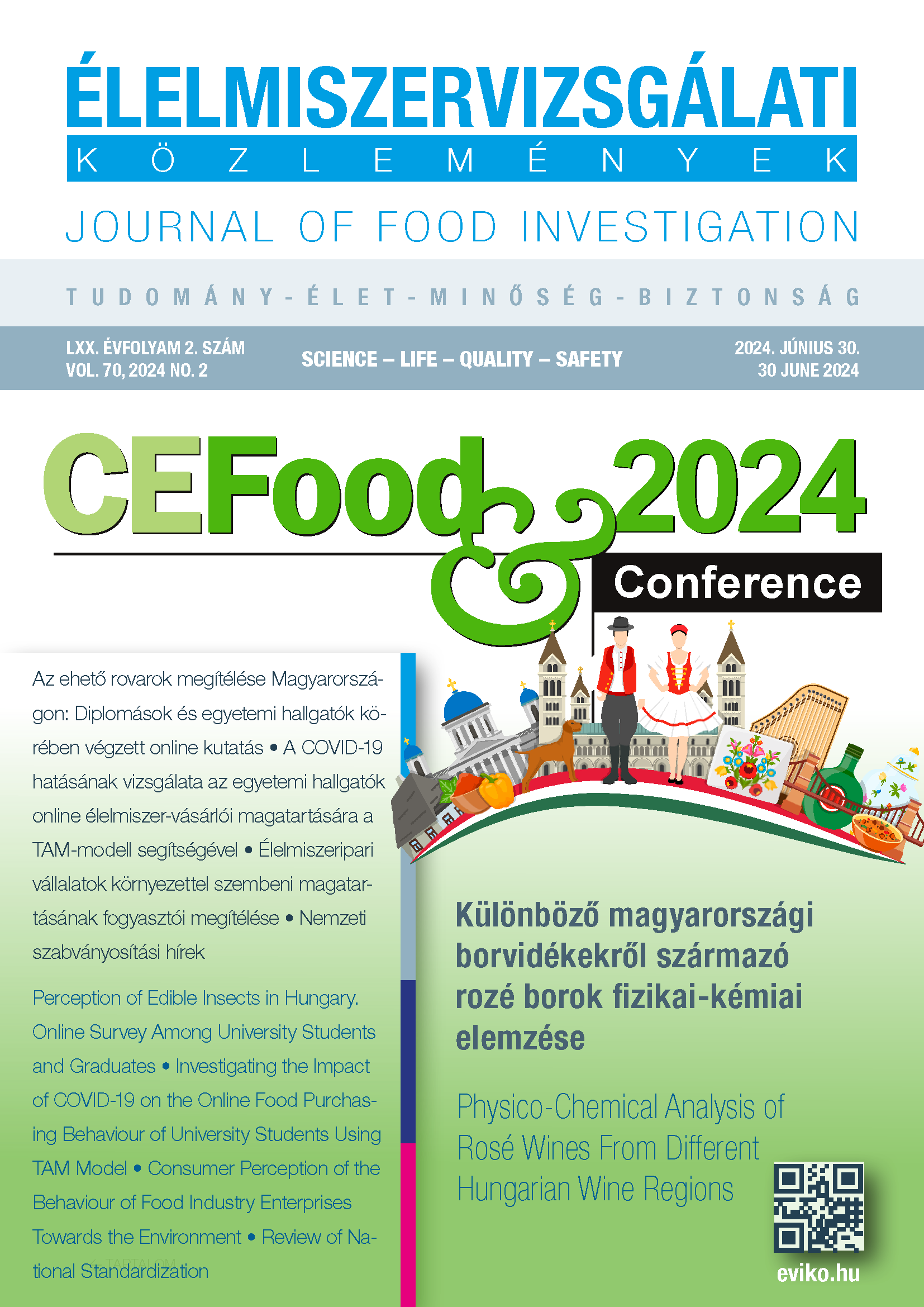Investigating the Impact of COVID-19 on the Online Food Purchasing Behaviour of University Students Using TAM Model
Main Article Content
Abstract
The coronavirus epidemic has transformed the daily lives of people around the world. COVID-19 has also had a significant impact on digital behavior, as strict government measures and restrictions due to the virus have pushed consumers towards safer shopping alternatives. This has led to an unprecedented and dynamic growth in online grocery shopping alongside other leading product categories (clothes, shoes, electronics) (McKinsey & Company, 2021). The primary research was conducted through a questionnaire survey (quantitative method) involving Hungarian and foreign students studying Economics and Business Administration at the University of Debrecen. To reach a higher number of foreign students, we also shared the questionnaire with the Debrecen branch of the International Student Union (ISU) and the International Students in Debrecen group with the permission of the administrators. This research was based on the Technology Acceptance Model (TAM model) and primarily investigated how the attitudes of Hungarian and foreign university students toward online food shopping changed as a result of the COVID-19 outbreak.
The students rated the 18 statements on which the research was based on a Likert scale, taken from Radka and Martin's research. Cronbach's Alpha value proved that the scale was measured correctly, and then data reduction was performed using factor analysis. Further principal component analysis was performed on the statements belonging to three factors to generate cleaner latent variables. This helped to improve technical understanding. Finally, we sorted Hungarian and foreign students into relatively homogeneous groups using the K-means clustering procedure. Thus, four clusters were created within each of the Hungarian and foreign student datasets.
Downloads
Article Details
References
Bauerová, R., & Klepek, M. (2018). Technology acceptance as a determinant of online grocery shopping adoption. Acta Universitatis Agriculturae Et Silviculturae Mendelianae Brunensis, 66(3)
Charness, N., & Boot, W. R. (2016). Technology, gaming, and social networking. Handbook of the psychology of aging (pp. 389-407) Elsevier.
Chen, H., Qian, W., & Wen, Q. (2021). The impact of the COVID-19 pandemic on consumption: Learning from high-frequency transaction data. Paper presented at the AEA Papers and Proceedings, , 111 307-311.
Chien, A., Kurnia, S., & von Westarp, F. (2003). The acceptance of online grocery shopping.
Davis, F. D. (1989). Perceived usefulness, perceived ease of use, and user acceptance of information technology. MIS Quarterly, , 319-340.
Fagundes, A. F. A., do Prado, R. A. D. P., da Silva Gabriel, M. L. D., & do Amaral Moretti, S. L. (2020).
Prevention and future spending intentions during COVID-19: A study considering decision-making under risk. REMark, 19(4), 924.
Legris, P., Ingham, J., & Collerette, P. (2003). Why do people use information technology? A critical review of the technology acceptance model. Information & Management, 40(3), 191-204.
Malhotra, S. (2014). A study on marketing fast moving consumer goods (FMCG). International Journal of Innovative Research & Development, 3(1), 1-3.
Piros, E., & Fehér, A. (2020a). Az élelmiszer-vásárlói magatartás vizsgálata online környezetben–Szakirodalmi áttekintés. Táplálkozásmarketing, 7(1), 67-78.
Piros, E., & Fehér, A. (2020b). Egyetemi hallgatók online élelmiszer-vásárlói magatartás vizsgálata a TAMmodell alapján. Táplálkozásmarketing, 7(2), 3-19.
Sajtos, L., & Mitev, A. (2007). SPSS kutatási és adatelemzési kézikönyv. (No Title),
Debreceni Egyetem (2022): A Debreceni Egyetem hallgatóinak 2021. október 15-i létszámadatai képzési szintek szerint. https://unideb.hu/hallgatoi-statisztikak Letöltés dátuma: 2022. 01.10).
Kantar Worldpanel (2015): Accelerating the growth of e-commerce in FMCG, http://www.kantarworldpanel.com/global/news/FMCG-online-salesto-reach-130-billion-by-2025 (Letöltés dátuma: 2021.11.10.)
Kemp, S. (2021): Digital 2021: Global overview report. https://datareportal.com/reports/digital-2021-global-overview-report, (Letöltés dátuma: 2021.10.12.)
Kormány (2020): Tájékoztató az új koronavírusos (COVID-19) megbetegedésekkel kapcsolatban. https://konzuliszolgalat.kormany.hu/koronavirus (Letöltés dátuma: 2021. 09.21.)
Koronavirus.gov.hu (2021): Tájékoztató oldal a koronavírusról. https://koronavirus.gov.hu/ (Letöltés dátuma: 2022. 01.01.)
McKinsey & Company (2021): Disruption & Uncertainty The State of Grocery Retail 2021. disruption-anduncertainty-the-state-of-grocery-retail-2021-europe-final.pdf (mckinsey.com), (Letöltés dátuma: 2021.10.01.)
Portfolio (2021): Megdöbbentő leleplezés a tudóstól: hatalmasat tévedett a WHO a koronavírus eredetéről. https://www.portfolio.hu/global/20211119/megdobbento-leleplezes-a-tudostolhatalmasat-tevedett-a-who-a-koronavirus-eredeterol-511646 (Letöltés dátuma: 2021.12.01.)
YouGov (2021): YouGov’s International FMCG/CPG Report 2021. https://commercial.yougov.com/rs/464-VHH-988/images/YouGov-International-FMCG-Report-2021.pdf?mkt_tok=NDY0LVZISC05ODgAAAF8iD6a9ZJBMDu91AZGMUTn-Jq_ZJP7OsrofKeW3ptOLLA6DAoExPU6JB8YlCTr1tSVgGWNK1iduuPDg5t5vEC9qgScnN0-g0YkcjG1jyy9, (Letöltés dátuma: 2021.10.13.)

